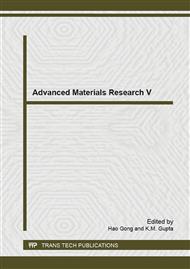p.182
p.190
p.195
p.203
p.208
p.215
p.220
p.225
p.231
An Experimental Investigation on Specific Heat Capacity and Enthalpy of Al 6061-SiC-Gr Hybrid Metal Matrix Composites Using Differential Scanning Calorimetry
Abstract:
Metal matrix composites are regarded to be one of the most predominant classifications in composites. The thermal characterization of metal matrix composites using Differential Scanning Calorimetry is a resourceful technique for the determination of heat flow distribution, specific heat capacity and enthalpy. The measurement of the thermal properties of materials is fundamental for the better understanding of the thermal design. Differential Scanning Calorimeter (DSC) is a technique that measures the difference in the heat flow to a sample and to a reference sample as a direct function of time or temperature under heating, cooling or isothermal conditions. In the present research, evaluation of specific heat capacity and enthalpy are accomplished for Al 6061, Silicon Carbide and Graphite hybrid metal matrix composites from room temperature to 300°C based on heat flow response. Based on endothermic and exothermic processes, the heat flow can be shown clearly depending on heating rate and gradual variation in temperature. The heat flow and heating rate are beneficial in the estimation of specific heat capacity for different percentage compositions of the hybrid composites.
Info:
Periodical:
Pages:
208-214
DOI:
Citation:
Online since:
May 2015
Authors:
Price:
Сopyright:
© 2015 Trans Tech Publications Ltd. All Rights Reserved
Share:
Citation:


